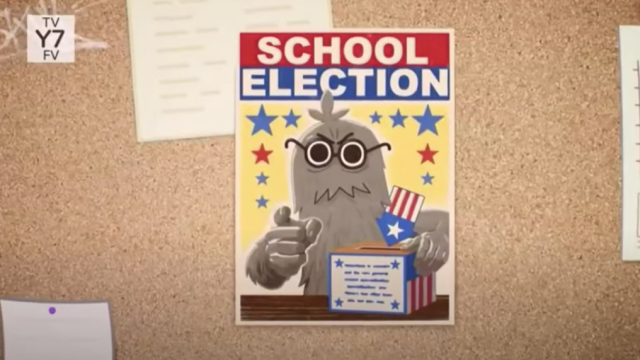Apropos of absolutely nothing going on in the real world this week, The Amazing World of Gumball just aired a very special Vote Gumball event, following the most obnoxious member of the Watterson family as they made a bid to become Elmore Jr. High’s next student body president.
For those unfamiliar with the animated series, it focuses on Gumball, a 12-year-old talking cat born to a sardonic cat mother and a slovenly rabbit father who do their best to survive the antics of Gumball and his siblings — Darwin and Anais — that tend to get the family in all sorts of ridiculous situations. Though Gumball’s an animated series, the show features a broad variety of artistic styles that both clash and blend together to create a reality in which drastically different kinds of beings (3D dinosaurs and two-dimensional stick figures, for example) coexist in relative peace.
Gumball’s artistic style has always worked as a solid reflection of the show’s messages about the importance of treating people who aren’t exactly like you with basic human (though actual humans don’t really exist in Gumball) decency. The election special hammers this idea home with particular force, in large part because each of Vote Gumball’s four episodes was, technically speaking, a clip show revisiting moments from earlier seasons. But the narrative conceit the Vote special uses to justify its recycled scenes actually ends up making for a rather clever story about how important it is to pay attention to history when casting one’s ballot.
The moment that Gumball realises that he has a shot at becoming Elmore Jr. High’s next President, he immediately sets out to find a potential running mate, and each of Vote Gumball’s eleven-minute-long episodes focuses on him trying to convince one of his classmates to join him on the ticket. Though Gumball immediately considers himself a viable candidate, his lack of a cohesive platform, strategy, or any real reason to run for office other than vanity and boredom are just a few of the reasons Darwin’s quick to decline his brother’s offer as Vote Gumball opens.
Gumball’s narcissism and general lack of forethought are hallmarks of his personality that, in any other episode, wouldn’t be all that big of a deal. His adventures usually involve him getting into well-meant mischief around town, but in Vote Gumball, the show takes the time to emphasise how his present-day personality prompts people to look back on their pasts with him and reflect on all the reasons they want nothing to do with his campaign. When Darwin recalls all of the ways that Gumball’s thrown him under the bus, it’s easy for him to turn his brother down, but rather than taking Darwin’s concerns to heart and resolving to become the kind of person people would want their student body president to be, he sets out to court a number of his other classmates who all find different and deeply valid reasons to say no.
[referenced id=”1523488″ url=”https://gizmodo.com.au/2020/10/new-steven-universe-psa-states-the-obvious-racism-is-for-losers/” thumb=”https://gizmodo.com.au/wp-content/uploads/2020/10/28/n1twray9qrqgfupmeheg-300×169.gif” title=”New Steven Universe PSA States the Obvious: Racism Is for Losers” excerpt=”While Steven Universe’s epic story has come to a close, the Crystal Gems aren’t quite finished with the world just yet.”]
At the same time that Vote Gumball illustrates how a would-be candidate’s past is important to bear in mind as they attempt to become a part of the political future, the special also touches on the manoeuvring that goes into a savvy presidential campaign. Gumball reasons that his shapeshifting fairy girlfriend Penny could make a strong running mate both because of her being a popular cheerleader and because of the boost he’d received by running on a mixed-gender ticket. But while Gumball sees Penny as an opportunity to strengthen himself, she can only see him as a self-centered politician who has little to no real concern about the wellbeing of others, a position she substantiates with a series of carefully placed jumps into the past that all prove her point.
Vote Gumball takes its messaging about the messiness of modern-day elections that much further as Gumball attempts to harness the power of social media and a sentient robot in desperate attempts to establish himself as an unbeatable candidate. While all this happens, everyone around him repeatedly tells him that, much as he may hate to admit it, he’s simply not the president that the people want, and short of outright manipulating the election, there isn’t really a way for him to win.
By the special’s end, the story doesn’t actually come out with a clear winner of the school’s election or what the future will hold. Instead, it ends with everyone being quite aware of what the past few years of dealing with Gumball’s been like, and how time more than anything else has them convinced they’d do well to elect someone else.
